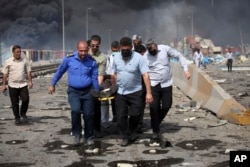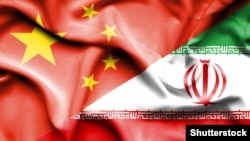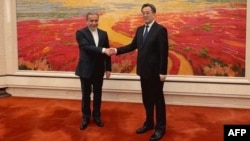
Welcome back to The Farda Briefing, an RFE/RL newsletter that tracks the key issues in Iran and explains why they matter.
I'm RFE/RL correspondent Kian Sharifi. In this edition, I'm looking at the potential economic impact of a massive explosion at Iran's Shahid Rajaei port and whether it will impact Iranian trade and hopes for foreign investment.
What You Need To Know
• Trade Braces For 'Shock' After Port Explosion: The massive explosion at Iran's Shahid Rajaei port on April 26 is unlikely to cripple Iran's economy, but it poses a "big shock" to the country's international trade, analysts say. Iranian authorities say the blast was caused by "noncompliance with safety precautions and negligence," but it remains unclear what exactly caused the blast that killed at least 70 people and injured more than 1,000.
• Nuclear Talks In Rome Postponed: A fourth round of nuclear talks between the United States and Iran was postponed. Mediated by Oman, the talks have reached a crucial phase where bridging differences on key issues were expected to be discussed. Iranian Foreign Ministry spokesman Esmaeil Baqaei said in a statement on May 1 that the decision to postpone the talks in Rome had been taken based on the proposal of Omani Foreign Minister Badr Albusaidi, who cited "logistical reasons" for the delay. He said the meeting was being rescheduled. State Department spokeswoman Tammy Bruce said the meeting had never been confirmed. The United States expects another round of talks "will take place in the near future," she said.
• Hijab Warning Text Message Raises Eyebrows: Some women in Tehran have received a text message from a state institution telling them that they have been observed in the city not complying with the mandatory hijab. The move has sparked widespread criticism, with many questioning how these individuals were identified and how their private phone numbers were obtained.
The Big Issue
Scaring Off Investors?
Analysts say the explosion will have major ramifications for not only Iranian trade through its busiest port but will also hinder the country's ability to attract investment.
The explosion obliterated over 10,000 shipping containers and set fuel storage tanks ablaze, causing a temporary suspension of foreign trade.
Paris-based economist Djamchid Assadi told RFE/RL's Radio Farda that while the explosion was unlikely to cripple Iran's sanctions-hit economy, it would have a "very negative" effect on both the supply of goods and securing foreign investment.
He said, regardless of whether the accident was caused by incompetence or sabotage, it raises questions about the level of safety in Iran's business environment.
"How can you hope to attract investment when you cannot ensure safety and security in that port?" Assadi argued.
While the authorities insist operations at the port have resumed, Azerbaijan-based energy and economy expert Dalga Khatinoglu said it will be a while before the port can return to business as usual.
"This will be a big shock to Iran's international trade," he told Radio Farda.
Why It Matters: The Shahid Rajaei port in Bandar Abbas is located near the Strait of Hormuz, through which about 20 percent of the world's oil trade passes.
Commonly dubbed Iran's "golden gateway" to international commerce by Iranian media, Shahid Rajaei port manages about 85 percent of the nation's container throughput, over half of its overall trade, and 70 percent of its transit shipments.
What's Being Said: Hossein Zafari, a spokesman for Iran's crisis management agency, suggested the explosion may have resulted from improperly stored chemical materials within containers at the port.
Publicly available data indicate that shipments of chemical components used in missile propellant were received from China at the port in February and March. Nonetheless, a Defense Ministry spokesman has refuted claims that any military-related cargo, including missile fuel, was present at the explosion site.
Renowned Iranian filmmaker Jafar Panahi described the explosion as a symbol of "the collapse of a regime that has led Iran into ruin for nearly half a century" and demanded a referendum to "restore sovereignty to the people."
Expert Opinion: "There will be a big shock, particularly if administrative buildings in the terminal are also destroyed, which will cause a serious disruption to imports and exports," Khatinoglu said.
That's all from me for now.
Until next time,
Kian Sharifi
If you enjoyed this briefing and don't want to miss the next edition, subscribe here . It will be sent to your inbox every Friday.






